APOEL F.C.
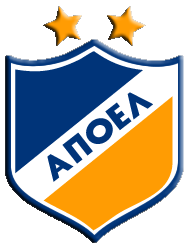 |
||||
| Full name | Athletikos Podosferikos Omilos Ellinon Lefkosias (Athletic Football Club of Greeks of Nicosia) Greek: Aθλητικός Ποδοσφαιρικός Όμιλος Eλλήνων Λευκωσίας |
|||
|---|---|---|---|---|
| Nickname(s) | Thrylos (legend) (Greek: Θρύλος) | |||
| Founded | November 8, 1926 | |||
| Ground | GSP Stadium, Nicosia, Cyprus (Capacity: 22,859) |
|||
| Chairman | ||||
| Manager | ||||
| League | Cypriot First Division | |||
| 2009–10 | 2nd | |||
|
||||
APOEL F.C. (Greek: ΑΠΟΕΛ Ποδόσφαιρο; short for Αθλητικός Ποδοσφαιρικός Όμιλος Ελλήνων Λευκωσίας, Athlitikos Podosfairikos Omilos Ellinon Lefkosias, "Athletic Football Club of Greeks of Nicosia") is a professional football club based in Lefkosia (Nicosia), Cyprus and they are one of the founding members of the Cyprus Football Association.[1] APOEL is one of the most popular football teams in Cyprus and they are the most successful with an overall tally of 20 championships, 19 cups and 11 super cups. It's the first team in Cyprus that reached 20 championship titles. APOEL's European competitions highlights include appearances in the group stages of the 2009–10 UEFA Champions League -along with Chelsea, Porto and Athletico Madrid- the second round of the 2002–03 UEFA Cup and the play-offs of the 2010–11 UEFA Europa League. APOEL F.C. is part of the APOEL multisport club, which was founded in 1926 and maintains departments for several sports including football, basketball, volleyball, table tennis and cycling.
History
1926–1929 : The early years
The club was formed as POEL (Greek: ΠΟΕΛ; Ποδοσφαιρικός Όμιλος Ελλήνων Λευκωσίας, Podosferikos Omilos Ellinon Lefkosias, Football Club of Greeks of Nicosia) on November 8, 1926. The club's formation came about when a group of forty people, with a common vision, met and set the foundations for creating a football club that would represent all Greeks of the capital. The meeting took place at a traditional confectionery, owned by Charalambos Hadjioannou, downtown in Ledra Street and the first president of the club was Giorgos Poulias[2]. The first clubhouse was the "Athenians Club" (Greek: Λέσχη Αθηναίων) at the end of Ledra Street.[2]
After a journey to the football club in Alexandria, Egypt in 1927 the General Assembly of 1928 decided the players showed that they were not just good footballers but also excellent track and field athletes. Hence it was decided to create a track and field team in addition to the football team. The name APOEL was adopted to reflect this, with the 'A' standing for 'Athletic'. Soon after a volleyball team and a table tennis team were established.
The '30s : The first championships
Cyprus did not have any country-wide league until 1932. Football clubs of the time played friendly matches only. In 1932, Pezoporikos Larnaca organised an unofficial league, the first island-wide league, and it was won by APOEL after defeating AEL Limassol on the final with 4–0. In 1934, there was a disagreement between Trast AC and Anorthosis Famagusta on the organisation of the fourth unofficial league. APOEL and AEL Limassol organised a meeting for the foundation of a country-wide governing body and an official country-wide league. The meeting took place in APOEL's clubhouse on September 23 and the establishment of the Cyprus Football Association was agreed. Two years later the APOEL football team celebrated its first championship title of the official Cyprus football league. APOEL also won the championship for the following four years, making this a very successful period for the club with 5 consecutive championships (1936–1940).[1]
The 1948 conflicts
Politics, however, would soon spark conflict within the team. On May 23, 1948 the board of the club send a telegram to the Hellenic Association of Amateur Athletics (Greek: Σ.Ε.Γ.Α.Σ.), with the opportunity of the annual Panhellenic Track and Field Competition, which included wishes that "the rebellion" is finished. Several leftist club members perceived the telegram as a political comment on the Greek Civil War and they distanced themselves from the club.[3] A few days later, on June 4, 1948, they founded Omonia Nicosia Football Club. Omonia is to this date the arch rival of APOEL and there has been a traditional animosity between the fans of the two teams.
1955–59 period
More conflicts led to further struggles for APOEL. Athletes belonging to the club frequently participated in national clashes. During the 1955–59 national up-rise against the British, many of APOEL's athletes and members of the club were active members of EOKA (the National Organisation of Cypriot Fighters), the most outstanding example being the club's track and field athlete Michalakis Karaolis who was hanged by the British colonial authorities. During this period the football team had their closest brush with relegation as most football players were actively taking part in the national struggle.
Triumph in UEFA Cup Winners' Cup 1963–64
The football team were quickly back to full strength and made their debut in European Competitions (the first not only for APOEL but for any Cypriot team) in 1963, when they faced the Norwegian team SK Gjøvik-Lyn in the UEFA Cup Winners' Cup. Two victories for APOEL over both legs (6–0, 1–0) marked APOEL's successful European debut, as they became the first Hellenic team to progress in a European Competition. The next round against the tournament winners Sporting Clube de Portugal met APOEL with their heaviest defeat ever (16–1) and put an end to APOEL's European debut.[3]
The successful participation in pan-Hellenic Greek championship
Other triumphs followed in the early 1970s. In 1973 the domestic double was achieved with coach Panos Markovic. The following year APOEL became the only Cypriot team to avoid relegation from the pan-Hellenic Greek Championship. That was also the last season that the Cypriot champion played in the Greek Football League the following year due to the volatile situation in Cyprus during 1974.[3] 1973 also saw triumphs for the basketball side of APOEL, who gained their first trophy by winning the national cup. Three years later in 1976 they succeeded in winning the first basketball championship. The volleyball side of the club experienced their most successful period between 1979 and 1985 when they won six championships and five cups.
The '80s : European Cup 1986–87 withdrawal
The 1980s were a relatively fruitless period for APOEL. They have only won two championships (1980,1986), one cup (1984) and two FA shields (1984, 1986). In 1986 APOEL was drawn against Beşiktaş J.K. for the second round of the European Cup. This was the first time that a Cypriot team faced a Turkish team in a European football competition. The Cypriot government prohibited APOEL from playing against the Turkish team, so APOEL was punished with two years disqualification from any UEFA competition.[4] This penalty was later reduced to 1 year.
The '90s : The unbeaten "double" in 1995–96
The 90s were a successful decade for APOEL with 3 championships (1990, 1992, 1996), 5 cups (1993, 1995, 1996, 1997, 1999) and 4 FA shields (1992, 1993, 1996, 1999). The most successful season in the 90s was 1995–96 in which APOEL achieved a celebratory double while remaining undefeated in the league. The basketball team won a double on the same season, making this the ideal season for a 70th anniversary celebration.
APOEL FC company formed
On 1996 the APOEL Football Ltd. was formed.[5] This had a significant effect on the club because it separated the activities of the football team from those of the sports club. The formation of the company was necessitated by the financial difficulties the team faced at the time.[5] The company began its operations with a capital of CY£600,000.[5]
European campaign 2002–03
In 2002, the football team embarked on an impressive European run, playing ten games before being knocked out, an impressive feat for a Cypriot club. The team participated in the Champions League and was knocked out by AEK Athens on the third qualifying round. They entered the UEFA Cup on the first round and advanced until the second round when they were knocked out by Hertha BSC Berlin.
Champions League 2009–10 success
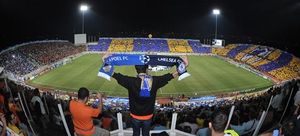
| Team | Pld | W | D | L | GF | GA | GD | Pts |
|---|---|---|---|---|---|---|---|---|
| 6 | 4 | 2 | 0 | 11 | 4 | +7 | 14 | |
| 6 | 4 | 0 | 2 | 8 | 3 | +5 | 12 | |
| 6 | 0 | 3 | 3 | 3 | 12 | −9 | 3 | |
| 6 | 0 | 3 | 3 | 4 | 7 | −3 | 3 |
However, the biggest success of the club in European competitions came on 26 August 2009, when the team knocked out F.C. Copenhagen from 2009–10 Champions League play-off round by winning 3–2 on aggregate and reached the group stages of 2009–10 UEFA Champions League. APOEL drawn in Group D, having to face Chelsea FC, FC Porto and Atlético Madrid. APOEL made history very early in its debut in Champions League group stages, by getting a 0–0 draw against Atlético Madrid at the first game at Vicente Calderón Stadium. At the second game faced up English giants Chelsea F.C. where the Cypriot team was beaten from an early Nicolas Anelka's goal on 18th minute. On matchday three APOEL played against FC Porto at Dragão. APOEL took the lead on 22’ from Alvaro Pereira's own goal but finally lost as long as Hulk scored two goals on 33’ and 48’ with a penalty. Then followed another match against FC Porto, but in Nicosia this time. APOEL stood well but succumbed in the superiority of the Portuguese and lost in 84th minute after Radamel Falcao's late goal. The fifth match of the UEFA Champions League Group D saw APOEL drawing with Atlético Madrid 1–1 at GSP Stadium. APOEL took the lead in the game on 5' after Nenad Mirosavljević scored, but Atlético Madrid equalised with the Portuguese international Simão Sabrosa on 62'. For matchday six, on December 8, 2009 APOEL travelled to London to play against Chelsea. At Stamford Bridge the team had the support of 6,000 fans who traveled from Cyprus. APOEL bidded farewell the Champions League with the head tally while came out even with 2–2 away. APOEL took the lead early (6th minute) with Marcin Żewłakow, but Chelsea turned the score after 20 minutes with two goals of Michael Essien on 19’ and Didier Drogba on 26'. APOEL didn't gave up and equalised after Nenad Mirosavljević scored on 87th minute. Finally, APOEL finished 4th in the group having the same points with Atlético Madrid. Despite the fact that APOEL had much better results and much better total goal difference from Atlético Madrid, failed to qualify to UEFA Europa League, because of the away goal that Atlético had scored in Nicosia.
Basketball and volleyball departments
APOEL has also a great history in Volleyball and Basketball. In volleyball APOEL won 8 championships (1 held by SEGAS, 1 by the Greek Volleyball Federation and 6 by the Cyprus Volleyball federation) and 5 Cups. Mainly the peak years for the APOEL volleyball team were between 1980–1990. Since then some good years were being made by the team but without any title outcome. In Basketball APOEL has the most cups won (11) and also has 10 championships in his golden history and there is no doubt that APOEL is one of the biggest basketball clubs in the country.
Academy
The APOEL academy are a separate legal entity from the football club. They are responsible for the under 21 teams for football, basketball and volleyball and they have their own board of directors and budget. The football academy has produced many quality Cypriot players over the years. The following players started from the academy and are now playing for APOEL: Michalis Morfis, Constantinos Charalambides, Nektarios Alexandrou, Marinos Satsias and Tasos Kissas. All of them have also competed at international level with the Cyprus National Football Team while Charalambides and Nektarios Alexandrou have played for teams in the Greek Super League in the past.
Colours and badge
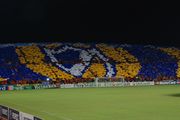
APOEL's colours are blue and yellow. Blue symbolises Greece and yellow symbolises Cyprus. The logo is a blue and yellow shield with the name of the club written diagonally in blue. After the club won their 20th championship (season 2008–09) two stars were added over the logo to symbolise the 20 championships. Other than that, the badge has remained the same since the establishment of the club.
Stadium

APOEL plays in the 22,859 seater New GSP Stadium (also known as the Pancypria Stadium), the biggest stadium in Cyprus, since October 23, 1999. They share it with local rivals Omonia.
APOEL played in the Makario Stadium from 1978 until 1999 and in the Old GSP Stadium before that.
The club's basketball and volleyball teams host their matches in the 3,000 seater Lefkotheo Indoor Arena which was built in 1980. The Lefkotheo Indoor Arena is also shared with Omonia. For many years APOEL B.C. used as home venue the biggest indoor sport venue in the island, the Eleftheria Indoor Hall with a capacity of 6,800 seats.
Supporters
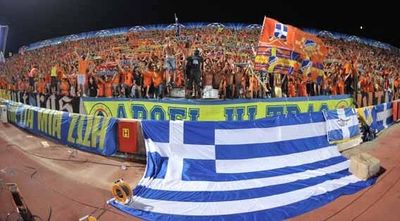
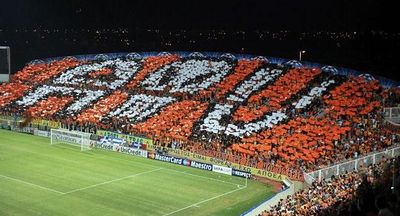
APOEL is one of the most popular teams in Cyprus. APOEL fans are right-wing in their majority but there are no strong ties between the organised fans and any political party. That wasn't always the case but during the past years they have actively avoided association with any political party. During political elections the organised fans post "My (Political) Party is APOEL" (in Greek) on banners outside the fan club, stickers etc.
The main supporter group is PAN.SY.FI (Greek: ΠΑΝ.ΣΥ.ΦΙ). PAN.SY.FI was founded in 1979 [6] and has branches in all major cities in Cyprus and also in other countries. The PAN.SY.FI (and most ultras) wear orange jackets (or T-shirts). The first game they sported the orange jackets was during the first round game of the 1992–93 championship against AEL Limassol in Makario Stadium.[6]
The club record for ticket sales in a single season is 122,734 (16 matches, home league games only) during the 2008–09 season. The club record for average league games attendance in a single season is 8,924 (13 matches, home league games only) during the 2006–07 season[7] The number of season tickets sold for the 2009–10 season was 5,843.
APOEL holds the record of the highest home attendance for Cyprus First Division in the game against Omonia with 23,043 tickets for 2002–03 season. The match was held at GSP Stadium on December 7, 2002.
The club holds also the record of the highest attendance for European Competition game with 21,657 tickets in the match against Chelsea FC for the 2009–10 Champions League group stage. The match was held on September 30, 2009 at GSP Stadium of Nicosia. The supporters of the club achieved a sold out in just few days and it is estimated that the game attended over 22,000 fans.
On December 8, 2009 the APOEL fans created another important record. More than 6,000 fans of the team travelled to London at Stamford Bridge for the last match of the 2009–10 Champions League group D against Chelsea FC. This is the biggest number of fans of any Cypriot team that had ever travelled away from Cyprus.
During season 2009–10 APOEL sold in total 254,119 tickets in all competitions (home matches only), creating a great record that is very difficult to break by other Cypriot team.
Current squad
Last Update: July 28, 2010[8]
Note: Flags indicate national team as has been defined under FIFA eligibility rules. Players may hold more than one non-FIFA nationality.
|
|
For recent transfers, see List of Cypriot football transfers summer 2010.
Club officials
Board of directors
- Chairman: Fivos Erotokritou
- Vice-Chairman A': Giorgos Georgiou
- Vice-Chairman B': Antis Polydorou
- Vice-Chairman C': Theodoros Kyriakides
- Secretary: Andreas Spyrides
- Member: Andreas Hadjikyriakos
- Member: Alkis Philippou
- Member: Takis Antoniou
- Member: Constantinos Constantinou
- Member: Stelios Zambas
- Member: Christoforos Potamitis
- Member: Christos Hadjikyriakos
- Member: Giannos Pantazis
- Member: Marios Charalambous
- Member: Costas Schizas
- Communication Director: Panikos Hadjiliasis
- APOEL B.C. President: Prodromos Petrides[9]
Coaching staff
- Manager: Ivan Jovanović
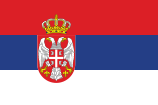

- Assistant Manager: Yiannos Ioannou

- Assistant Manager: Predrag Erak

- Fitness Coach: Giorgos Paraskeva

- Goalkeepers coach: Jovan Mihajlovic

Medical staff
- Club Doctor: Dr. Costas Schizas

- First Team Physiotherapist: Antonis Kentelis

- Assistant First Team Physiotherapist: Dimitri Stoyanov
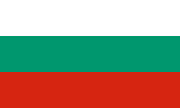
- Team Nutritionist: Nicoletta Michaelidou

Sponsorship
- Official Shirt Sponsor – MTN [10]
- Official Back Shirt Sponsor – Abacus
- Official Short Sponsor – GCC
- Official Sport Clothing Manufacturer – Puma
- Official Athletism Sponsor – Jeep
- Official Stadium Sponsor – Alfa Capital Holdings
- Official Communication Sponsor – LTV
- Official Sport Drink – Isostar
Other sponsors
Notable former players
See also Category: APOEL FC players
|
|
|
|
Managerial history
See also Category: APOEL FC managers
Last Update: May 9, 2008 [12]
|
|
|
Presidential history
APOEL has had numerous presidents over the course of their history. Since the establishment of APOEL Football Ltd., the presidents of the board of directors of the company (chairmen) have assumed all presidential duties for the football club. Here are complete lists of both:[13]
|
Presidents:
|
Chairmen:
|
Achievements
Football
- Cypriot Championships: 20 (Record)
- Cypriot Cups: 19 (Record)
-
- 1937, 1941, 1947, 1951, 1963, 1968, 1969, 1973, 1976, 1978, 1979, 1984, 1993, 1995, 1996, 1997, 1999, 2006, 2008
- LTV Super Cups: 11
-
- 1963, 1984, 1986, 1992, 1993, 1996, 1997, 2002, 2004, 2008, 2009
Basketball
- Cypriot Championships: 10
-
- 1976, 1979, 1981, 1995, 1996, 1998, 1999, 2002, 2009, 2010
- Cypriot Cups: 11 (Record)
-
- 1973, 1979, 1984, 1986, 1991, 1993, 1994, 1995, 1996, 2002, 2003
- Cyprus Supercups: 9 (Record)
-
- 1972, 1976, 1986, 1994, 1995, 1996, 1998, 2001, 2002
Volleyball
- Cypriot Championships: 7
-
- 1972, 1979, 1980, 1981, 1983, 1984, 1985
- Cypriot Cups: 5
-
- 1979, 1981, 1982, 1984, 1985
Records
- Record League win: 17–1 vs
 Aris Limassol, 1966–67
Aris Limassol, 1966–67
- Record League defeat: 6–1 vs
 Nea Salamina, 1997–98
Nea Salamina, 1997–98
- Record European competition win: 6–0 vs
 SK Gjøvik-Lyn, UEFA Cup Winners' Cup, Preliminary round 1st leg, 1963–64[16]
SK Gjøvik-Lyn, UEFA Cup Winners' Cup, Preliminary round 1st leg, 1963–64[16]
6–0 vs HB Tórshavn, UEFA Cup Winners' Cup, Qualifying round 2nd leg, 1997–98[17]
HB Tórshavn, UEFA Cup Winners' Cup, Qualifying round 2nd leg, 1997–98[17]
- Record European competition defeat: 16–1 vs
 Sporting CP, UEFA Cup Winners' Cup, 1st round 1st leg, 1963–64 [18]
Sporting CP, UEFA Cup Winners' Cup, 1st round 1st leg, 1963–64 [18]
- Most consecutive League games unbeaten: 34 – From September 18, 1946 to November 23, 1949
- Most consecutive League games won: 16 – From December 21, 2008 to April 11, 2009
- Most League points in a season:
- 3 for win: 82, 2008–09 (Full season) – 69, 2008–09 (regular season)
- 2 for win: 51, 1976–77
- Most League goals in a season: 89 – 1966–67
- Record European competition home attendance: 21,657 vs
 Chelsea FC (September 30, 2009)
Chelsea FC (September 30, 2009)
- Most League appearances for club: 371 –
 Yiannos Ioannou
Yiannos Ioannou
- Most League goals for club : 191 –
 Yiannos Ioannou
Yiannos Ioannou
European competitions record
Last Update: August 28, 2010[19]
| Competition | Played | Won | Drawn | Lost | GF | GA |
|---|---|---|---|---|---|---|
| UEFA Champion's League | 34 | 9 | 7 | 18 | 37 | 55 |
| UEFA Cup/Europa League | 50 | 19 | 13 | 18 | 75 | 71 |
| UEFA Cup Winner's Cup | 30 | 6 | 6 | 18 | 27 | 78 |
| TOTAL | 114 | 34 | 26 | 54 | 139 | 204 |
#Q = #preliminary, #PO = #play-offs, #G = #Group stage, #R = #round, 1/8 = quarter finals
| Season | Competition | Round | Country | Club | Home | Away | Aggregate | |
|---|---|---|---|---|---|---|---|---|
| 1963–64 | Cup Winners' Cup | Q | S.K. Gjøvik-Lyn | 6–0 | 1–0 | 7–0 | ||
| 1R | Sporting Portugal | 0–2 | 1–16 | 1–18 | ||||
| 1965–66 | European Cup | Q | SV Werder Bremen | 0–5 | 0–5 | 0–10 | ||
| 1968–69 | Cup Winners' Cup | 1R | Dunfermline Athletic FC | 0–2 | 1–10 | 1–12 | ||
| 1969–70 | Cup Winners' Cup | 1R | SK Lierse | 0–1 | 1–10 | 1–11 | ||
| 1973–74 | European Cup | 1R | FC Zorya Luhansk | 0–1 | 0–2 | 0–3 | ||
| 1976–77 | Cup Winners' Cup | 1R | Iraklis FC | 2–0 | 0–0 | 2–0 | ||
| 2R | SSC Napoli | 1–1 | 0–2 | 1–3 | ||||
| 1977–78 | UEFA Cup | 1R | Torino Calcio | 1–1 | 0–3 | 1–4 | ||
| 1978–79 | Cup Winners' Cup | 1R | Shamrock Rovers | 0–2 | 0–1 | 0–3 | ||
| 1979–80 | Cup Winners' Cup | Q | Boldklubben 1903 | 0–1 | 0–6 | 0–7 | ||
| 1980–81 | European Cup | 1R | BFC Dynamo Berlin | 2–1 | 0–3 | 2–4 | ||
| 1981–82 | UEFA Cup | 1R | FC Argeş Piteşti | 1–1 | 0–4 | 1–5 | ||
| 1984–85 | Cup Winners' Cup | 1R | Servette FC | 0–3 | 1–3 | 1–6 | ||
| 1985–86 | UEFA Cup | 1R | Lokomotiv Sofia | 2–2 | 2–4(aet) | 4–6 | ||
| 1986–87 | European Cup | 1R | HJK Helsinki | 1–0 | 2–3 | 3–3(a) | ||
| 2R | Besiktas JK | Withdrew (Political reasons) | ||||||
| 1988–89 | UEFA Cup | 1R | Velez Mostar | 2–5 | 0–1 | 2–6 | ||
| 1990–91 | European Cup | 1R | FC Bayern München | 2–3 | 0–4 | 2–7 | ||
| 1992–93 | Champions League | 1R | AEK Athens | 2–2 | 1–1 | 3–3(a) | ||
| 1993–94 | Cup Winners' Cup | Q | Bangor FC | 2–1 | 1–1 | 3–2 | ||
| 1R | Paris Saint-Germain | 0–1 | 0–2 | 0–3 | ||||
| 1995–96 | Cup Winners' Cup | Q | PFC Neftchi | 3–0 | 0–0 | 3–0 | ||
| 1R | Deportivo de La Coruña | 0–0 | 0–8 | 0–8 | ||||
| 1996–97 | UEFA Cup | 1Q | B71 Sandur | 4–2 | 5–1 | 9–3 | ||
| 2Q | Iraklis F.C. | 2–1 | 1–0 | 3–1 | ||||
| 1R | RCD Español | 2–2 | 0–1 | 2–3 | ||||
| 1997–98 | Cup Winners' Cup | Q | HB Tórshavn | 6–0 | 1–1 | 7–1 | ||
| 1R | SK Sturm Graz | 0–1 | 0–3 | 0–4 | ||||
| 1999-00 | UEFA Cup | Q | Levski Sofia | 0–0 | 0–2 | 0–2 | ||
| 2000–01 | UEFA Cup | Q | KS Tomori Berat | 2–0 | 3–2 | 5–2 | ||
| 1R | Club Brugge | 0–1 | 0–2 | 0–3 | ||||
| 2002–03 | Champions League | 1Q | FC Flora Tallinn | 1–0 | 0–0 | 1–0 | ||
| 2Q | NK Maribor | 4–2 | 1–2 | 5–4 | ||||
| 3Q | AEK Athens | 2–3 | 0–1 | 2–4 | ||||
| 2002–03 | UEFA Cup | 1R | Grazer AK | 2–0 | 1–1 | 3–1 | ||
| 2R | Hertha BSC Berlin | 0–1 | 0–4 | 0–5 | ||||
| 2003–04 | UEFA Cup | Q | Derry City FC | 2–1 | 3–0 | 5–1 | ||
| 1R | RCD Mallorca | 1–2 | 2–4 | 3–6 | ||||
| 2004–05 | Champions League | 2Q | Sparta Prague | 2–2 | 1–2 | 3–4 | ||
| 2005–06 | UEFA Cup | 1Q | Birkirkara FC | 4–0 | 2–0 | 6–0 | ||
| 2Q | Maccabi Tel Aviv FC | 1–0 | 2–2(aet) | 3–2 | ||||
| 1R | Hertha BSC Berlin | 0–1 | 1–3 | 1–4 | ||||
| 2006–07 | UEFA Cup | 1Q | SS Murata | 3–1 | 4–0 | 7–1 | ||
| 2Q | Trabzonspor | 1–1 | 0–1 | 1–2 | ||||
| 2007–08 | Champions League | 1Q | FC BATE | 2–0 | 0–3(aet) | 2–3 | ||
| 2008–09 | UEFA Cup | 1Q | FK Pelister | 1–0 | 0–0 | 1–0 | ||
| 2Q | Red Star Belgrade | 2–2 | 3–3(aet) | 5–5(a) | ||||
| 1R | FC Schalke 04 | 1–4 | 1–1 | 2–5 | ||||
| 2009–10 | Champions League | 2Q | EB/Streymur | 3–0 | 2–0 | 5–0 | ||
| 3Q | FK Partizan | 2–0 | 0–1 | 2–1 | ||||
| PO | FC Copenhagen | 3–1 | 0–1 | 3–2 | ||||
| G | Atlético Madrid | 1–1 | 0–0 | N/A | 4th |
|||
| G | Chelsea FC | 0–1 | 2–2 | N/A | ||||
| G | FC Porto | 0–1 | 1–2 | N/A | ||||
| 2010–11 | Europa League | 2Q | FK Tauras Tauragė | 3–1 | 3–0 | 6–1 | ||
| 3Q | FK Jablonec | 1–0 | 3–1 | 4–1 | ||||
| PO | Getafe CF | 1–1(aet) | 0–1 | 1–2 | ||||
UEFA Team Ranking
| Rank | Country | Team | Points |
|---|---|---|---|
| 115 | NEC Nijmegen | 13.425 | |
| 116 | Slovan Liberec | 13.270 | |
| 117 | Lech Poznań | 13.183 | |
| 118 | APOEL | 13.124 | |
| 119 | Mladá Boleslav | 12.770 | |
| 120 | Empoli | 12.367 | |
| 121 | Chievo Verona | 12.367 |
Last update: 29 August 2010
Source: xs4all.nl
APOEL F.C. as a company
The football department of APOEL is legally owned by APOEL Football Ltd (Greek: ΑΠΟΕΛ Ποδόσφαιρο Λτδ.), a public limited company,[20] since 1996. The company owns all the rights for the football department under an agreement with the APOEL sports club. The company pays the club CY£100,000 annually for the privilege.[5] The agreement between the company and the club is renewed every five years. The company, besides the football club, also maintains a team boutique (Orange Shop), the APOELFC (Greek: ΑΠΟΕΛFC) magazine and the apoelfc.com.cy website among others.
References
- ↑ 1.0 1.1 "Ιστορική Αναδρομή" (in Greek). APOEL FC. http://www.apoelfc.com.cy/nqcontent.cfm?a_id=1456&tt=graphic&lang=l1. Retrieved 2008-05-30.
- ↑ 2.0 2.1 "History of APOEL" (in Greek). APOEL FC. http://www.apoelfc.com.cy/nqcontent.cfm?a_id=1372&tt=graphic〈=l1. Retrieved 2008-04-13.
- ↑ 3.0 3.1 3.2 "Η ιστορία του ΑΠΟΕΛ" (in Greek). sansimera.gr. http://www.sansimera.gr/archive/articles/show.php?id=336&feature=APOEL. Retrieved 2008-05-28.
- ↑ "Περίοδος 1980 – 1990" (in Greek). APOEL FC. http://www.apoelfc.com.cy/nqcontent.cfm?a_id=1486. Retrieved 2008-05-30.
- ↑ 5.0 5.1 5.2 5.3 "Περίοδος 1990 – σήμερα" (in Greek). APOEL FC. http://www.apoelfc.com.cy/nqcontent.cfm?a_id=1487. Retrieved 2008-05-30.
- ↑ 6.0 6.1 "ΠΑΝ.ΣΥ.ΦΙ" (in Greek). APOEL FC. http://www.apoelfc.com.cy/nqcontent.cfm?a_id=1438&tt=graphic&lang=l1. Retrieved 2008-05-23.
- ↑ "Ticket Sales Statistics at GSP Stadium". gsp.org.cy. http://www.gsp.org.cy/Ticket%20Menu%20Statistics%20en.html. Retrieved 2008-05-23.
- ↑ "Team Roster" (in Greek). APOEL FC. 2010-05-20. http://www.apoelfc.com.cy/nqcontent.cfm?a_id=1363&tt=graphic&lang=l1. Retrieved 2010-05-20.
- ↑ "APOEL board of directors". http://www.apoelfc.com.cy/nqcontent.cfm?a_id=1375&tt=graphic&lang=l2.
- ↑ "Football". MTN Cyprus. 2007-06-01. http://www.mtn.com.cy/index.cfm/id/113/lang/english/football. Retrieved 2008-05-12.
- ↑ "David Esser". truegreats.com. 2008-04-16. http://www.truegreats.com/player.asp?p=164&c=69. Retrieved 2008-04-16.
- ↑ "Προηγούμενοι προπονητές" (in Greek). APOEL FC. 2008-05-09. http://www.apoelfc.com.cy/nqcontent.cfm?a_id=1442&tt=graphic&lang=l1. Retrieved 2008-05-09.
- ↑ "Οι πρόεδροι του ΑΠΟΕΛ" (in Greek). APOEL FC. http://www.apoelfc.com.cy/nqcontent.cfm?a_id=1393&tt=graphic&lang=l1. Retrieved 2008-05-17.
- ↑ "Video: Best Goals and moments from 2006–07". http://www.youtube.com/watch?v=BDGfCPcIZVk.
- ↑ "Video: Η πορεία προς τον τίτλο 2008–09" (in Greek). http://www.youtube.com/watch?v=rl3BZPbLnT4&feature=related.
- ↑ "UEFA Cup Winners' Cup – Season 1963–1964 – Preliminary round". UEFA. 2007-12-19. http://www.uefa.com/competitions/ecwc/history/season=1963/round=765/index.html. Retrieved 2008-05-12.
- ↑ "UEFA Cup Winners' Cup – Season 1997–1998 – Qualifying round". UEFA. 2009-01-16. http://www.uefa.com/competitions/ecwc/history/season=1997/round=733/index.html. Retrieved 2009-07-07.
- ↑ "UEFA Cup Winners' Cup – Season 1963–1964 – First Round". UEFA. 2007-12-19. http://www.uefa.com/competitions/ecwc/history/season=1963/round=766/index.html. Retrieved 2008-05-12.
- ↑ "Team Profile". UEFA. 2009-10-02. http://www.uefa.com/footballeurope/club=50118/domestic.html. Retrieved 2009-10-02.
- ↑ "Corporate Info". APOEL FC. http://www.apoelfc.com.cy/nqcontent.cfm?a_id=1370&tt=graphic&lang=l2. Retrieved 2009-05-26.
External links
Official
- APOEL FC (Official Website) (Greek)
- APOEL Academy (Greek)
Fan Sites
- Official APOEL Fans Website and Forums (Greek)
- Unofficial APOEL Fans Website and Forums (Greek)
- APOELLAS (Greek)
- APOEL UK Fan Club
- Apoel News (Greek)
- Fans of APOEL – Videoblog
- APOEL unofficial site on cjb.net (Greek)
- APOEL unofficial site (Greek)
- national-football-teams
|
||||||||||||||
|
|||||
|
|||||
|
|||||||||||||||||
|
|||||||||||||||||||||||
|
|||||